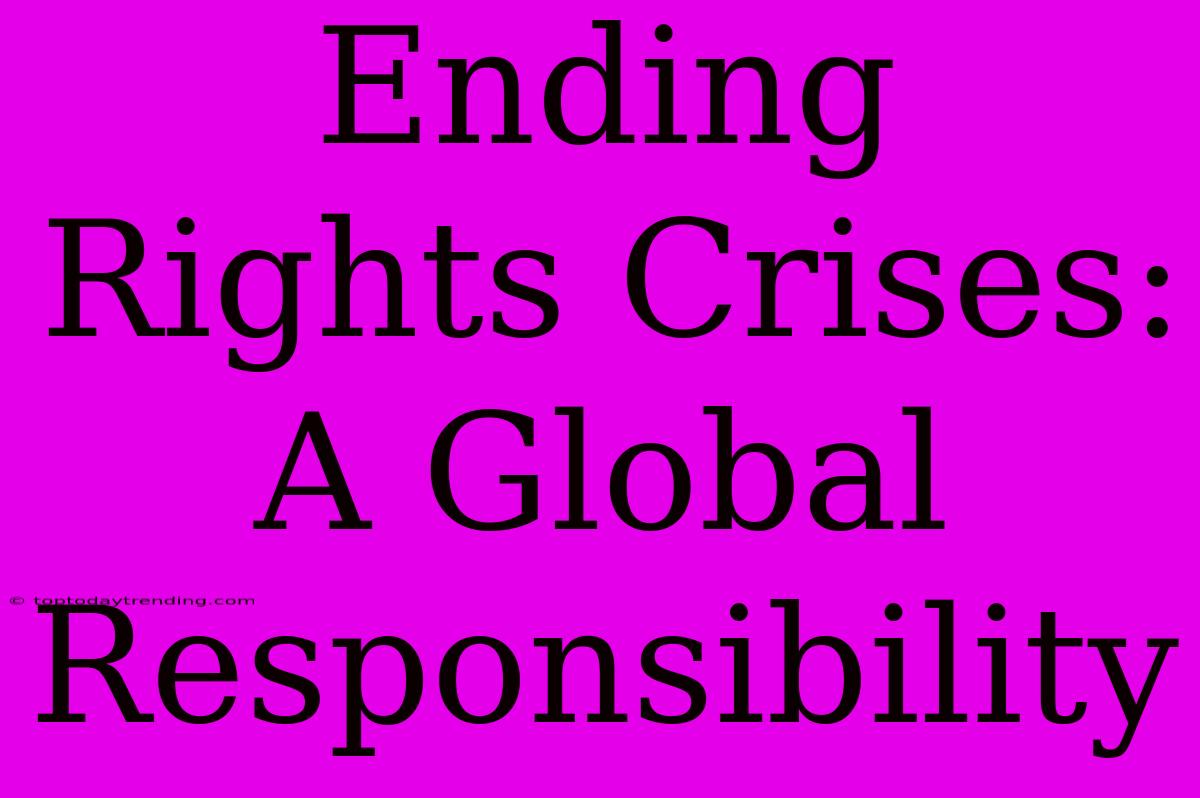Ending Rights Crises: A Global Responsibility
The world faces an alarming number of human rights crises, ranging from conflict and displacement to poverty, discrimination, and climate change. These crises are not only tragic in their immediate impact but also threaten the very foundation of a just and peaceful world. It's time to recognize that ending rights crises is a global responsibility, demanding collective action and a renewed commitment to human rights principles.
Understanding the Crisis
Human rights crises are not isolated events. They are interconnected and fueled by systemic inequalities, entrenched discrimination, and a lack of accountability.
- Conflict and Displacement: War and violence are major drivers of human rights crises, forcing millions from their homes and leaving them vulnerable to exploitation, abuse, and lack of access to essential services.
- Poverty and Inequality: Extreme poverty and economic inequality perpetuate human rights violations, leaving millions trapped in cycles of deprivation, forced labor, and lack of access to healthcare, education, and justice.
- Discrimination and Marginalization: Discrimination based on race, gender, sexual orientation, religion, or disability systematically denies individuals their fundamental rights and limits their opportunities.
- Climate Change: Climate change exacerbates existing inequalities and creates new challenges for human rights. Extreme weather events, displacement, and resource scarcity threaten livelihoods and fundamental rights.
A Collective Response:
Ending rights crises requires a comprehensive and collaborative approach:
1. Strengthening International Law and Institutions:
- UN Human Rights Mechanisms: Reinforcing the UN's human rights institutions and mechanisms, including the Human Rights Council and treaty bodies, is crucial for monitoring, reporting, and holding states accountable for their obligations.
- International Criminal Justice: Strengthening international criminal justice systems, including the International Criminal Court, is vital for prosecuting perpetrators of grave human rights violations and ensuring accountability.
- International Humanitarian Law: Promoting compliance with international humanitarian law is crucial for protecting civilians during armed conflict and ensuring respect for fundamental human rights.
2. Investing in Prevention and Early Intervention:
- Addressing Root Causes: Tackling the underlying causes of human rights crises, such as poverty, inequality, and discrimination, is crucial for preventing future violations.
- Early Warning Systems: Developing effective early warning systems to identify and address emerging human rights risks before they escalate into full-blown crises is vital for proactive prevention.
- Promoting Human Rights Education: Investing in human rights education and awareness-raising campaigns is crucial to empower individuals, strengthen civil society, and foster a culture of respect for human rights.
3. Promoting Sustainable Development and Peacebuilding:
- Sustainable Development Goals: The Sustainable Development Goals (SDGs) provide a roadmap for achieving a more just and equitable world, addressing issues such as poverty, hunger, and inequality that contribute to human rights crises.
- Peacebuilding and Conflict Resolution: Investing in conflict prevention, mediation, and post-conflict reconstruction is crucial for creating durable peace and preventing cycles of violence and human rights abuses.
4. Empowering Human Rights Defenders and Civil Society:
- Protecting Human Rights Defenders: States must protect human rights defenders and civil society organizations from harassment, intimidation, and violence.
- Supporting Local Initiatives: Providing support and resources to local human rights organizations and grassroots initiatives is essential for addressing rights crises effectively.
Global Responsibility:
It is not enough to simply acknowledge the existence of human rights crises. We must act. Ending rights crises requires a fundamental shift in our thinking and our approach.
- Collective Action: We need a global commitment to ending rights crises, with states, international organizations, civil society, and individuals working together.
- Accountability: States must be held accountable for their human rights obligations and commitments.
- Solidarity: We must stand in solidarity with victims of human rights violations and support their struggle for justice and dignity.
Ending human rights crises is a moral imperative and a necessity for a just and peaceful world. It is a shared responsibility that demands our collective action.

